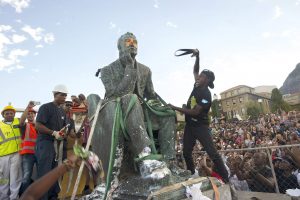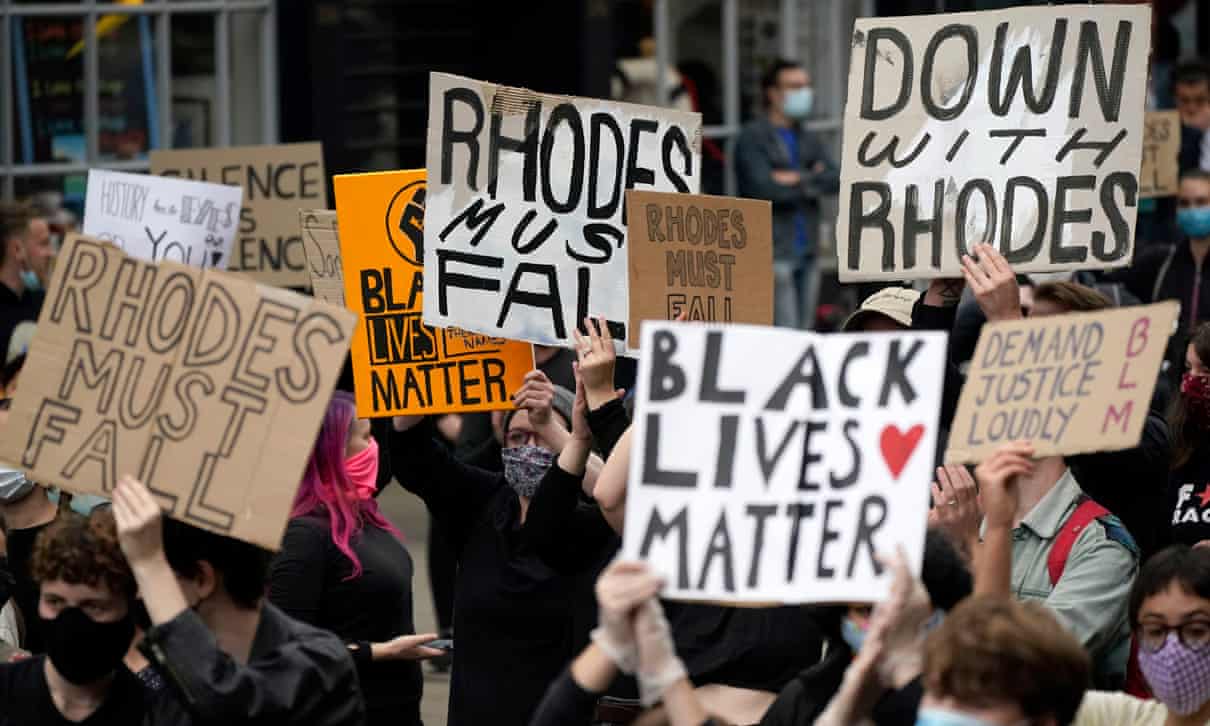Empire, whether understood in military-territorial terms or along with Hardt and Negri, is exploding across the world, starting with the United States. A black professor @ Oxford University captures one site of the explosion in the case of the British Empire in this piece lifted from The Guardian, (UK) www.theguardian.com/commentisfree/2020/jun/12/

A/Prof Chigudu, the author
“The city is strewn with tributes to the great of the British empire. The devaluation they wreaked is often forgotten”
The toppling of Edward Colston certainly made for a dramatic scene. The frantic energy of large crowds cheering while the statue plunged into the river in Bristol signalled the release of pent-up tension accumulated during a pandemic and widespread anti-racism protests.
Within 48 hours, Oxford was seized by the same zeal. More than 1,000 people gathered on the city’s high street to call for the removal of the statue commemorating the notorious Victorian imperialist Cecil John Rhodes. It was a coordinated, peaceful and impassioned protest about the statue and about structural racism in Britain.
When it was my turn to address the crowd, I introduced myself as one of about seven black professors (official statistics are not available) at the University of Oxford, to simultaneous cheer and shock. I proceeded to say that I am an angry black man, fully aware of the ugly stereotype that accompanies this image – hot-blooded, impervious to reason and unworthy of serious engagement – particularly when talking about matters of racial injustice.
But how could I not be angry? Like many other black people in the UK and around the world, I witnessed the brutal torture and killing of George Floyd with outrage and revulsion. Outrage and revulsion at the long legacy of structural and institutional racism that has killed, exploited, subjugated and silenced so many black people in the United States, in Britain and in former white-settler colonies.
It is this same outrage at institutional racism that ignited the Rhodes Must Fall (RMF) campaign in South Africa in early 2015. That protest rapidly became transnational, announcing itself in Oxford by asking uncomfortable questions about my university’s past.
A former imperial training ground, Oxford is strewn with tributes to the great men of the British empire, who have portraits, busts, engravings, statues and even buildings dedicated to their memory. In contrast, the histories of conquest, famine and dispossession that these men left in their wake are routinely forgotten.

Bringing Rhodes down at the University of Cape Town in 2015 in South Africa
RMF drew attention to this iconography as part of a varied agenda that included two additional aims: reforming the Eurocentric curriculums that dominate the university’s teaching and addressing the underrepresentation and inadequate welfare provision for black and minority-ethnic staff and students at Oxford. However, it did not take long before all focused on the removal of the Rhodes statue at Oriel College.
I was a PhD student in Oxford at that time as well as a founding member of our chapter of RMF. As a Zimbabwean, it was difficult for me to view Rhodes simply as a man with odious views compared with our contemporary standards, as if it were his words alone and not his actions that were under scrutiny.
Rhodes’ imperialism gave rise to a pattern of settler colonialism in Southern Africa predicated on racial domination in political, economic and social spheres. In Rhodesia, 8 million disenfranchised black people eked out a living at subsistence level or below it, while 250,000 white people, barely 3% of the population, owned more than half of the country’s available land, and virtually all of its business and industry, before independence from colonial rule in 1980. Education, healthcare and housing were all segregated, with white people enjoying levels equivalent to those in western Europe or the United States.
Rhodes’ statue, then, is no mere physical artefact. It is imbued with a noxious history. Its presence at Oriel College reframes Rhodes’ conquest as munificence to the university and fails to recognise the exploitation of African labour from which his estate was built. It belongs in a museum, where it can be properly historicised. More importantly, in 2015 and now, the calls for the removal of such statues open up discussions about how we talk about the dynamics of race and racism, inclusion and exclusion, and being and belonging in Britain.
Initial responses to RMF were hostile, infantilising and casually racist. The Conservative politician and Oriel College alumnus Daniel Hannan disparaged RMF as “cretinous”, dismissed its demands as “facile”, and said that students in the movement were “too dim” to be at university. Disappointingly, the otherwise astute and justly celebrated Cambridge professor, Mary Beard, argued that RMF is “a dangerous attempt to erase the past” and suggested that minority students should be empowered to look at the statue “with a cheery and self-confident sense of un-batterability”.

Current most successful postcolonial theorisation of the politicisation of racial practices

Another must
Will Hutton, the principal of Hertford College at Oxford, reminded RMF students that were it not for the legacies of the British empire, South Africa would descend into “unaccountable despotism” as embodied by then president, Jacob Zuma. Revealingly, apart from a tokenistic nod to Nelson Mandela, Hutton made no acknowledgment of Africans shaping their own political destiny, and seemingly held no conception of Africans as historical agents. As for the upper echelons of Oxford University’s leadership, the chancellor Lord Patten said that students unable to embrace Rhodes “should think about being educated elsewhere”.
Behind the spectacle of toppling a statue, RMF gained significant traction in the university’s student and faculty body, owing to the hard, behind-the-scenes work of a great many student activists. It is a bitter irony then that, for all the exaltation of peaceful protest and deliberative democracy, Oriel College refused to remove the statue as it risked losing £100m in donor gifts from wealthy alumni.
Four years later, we have an opportunity to engage in a more mature and honest conversation about race in Britain. The removal of the Rhodes statue would be a powerful gesture of public accountability and it would allow a good-faith discussion about institutional racism in my university as a small part of much broader demands for racial justice and equality in British society.
Numerous writers – the likes of Reni Eddo-Lodge, Afua Hirsch, Akala, Emma Dabiri, David Olusoga and Kehinde Andrews – have already done much hard work in articulating and contextualising the black experience in Britain. Anti-racist activists are channelling years of anger and pain into coordinated protests about Britain’s past and present. When the righteous fury and indignation over the present moment begins to simmer down, the messy work of challenging racism in all its structural, institutional and interpersonal guises must continue. But, this time, it will have a greater critical mass.
- Simukai Chigudu is associate professor of African politics at the University of Oxford




























